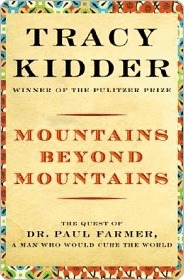More on this book
Community
Kindle Notes & Highlights
by
Tracy Kidder
Read between
May 23 - September 4, 2018
“I don’t care how often people say, ‘You’re a saint.’ It’s not that I mind it. It’s that it’s inaccurate.” This was seemly, I thought, resisting beatification. But then he told me, “People call me a saint and I think, I have to work harder. Because a saint would be a great thing to be.”
Farmer and his staff of community health workers treated most tuberculosis patients in their huts and spent between $150 and $200 to cure an uncomplicated case. The same cure in the United States, where most TB patients were hospitalized, usually cost between $15,000 and $20,000. My local hospital in Massachusetts was treating about 175,000 patients a year and had an annual operating budget of $60 million. In 1999 Zanmi Lasante had treated roughly the same number of people, at the medical complex and out in the communities, and had spent about $1.5 million, half of that in the form of donated
...more
He told me he slept about four hours a night but a few days later confessed, “I can’t sleep. There’s always somebody not getting treatment. I can’t stand that.”
“I feel ambivalent about selling my services in a world where some can’t buy them. You can feel ambivalent about that, because you should feel ambivalent. Comma.” This was for me one of the first of many encounters with Farmer’s use of the word comma, placed at the end of a sentence. It stood for the word that would follow the comma, which was asshole. I understood he wasn’t calling me one—he would never do that; he was almost invariably courteous. Comma was always directed at third parties, at those who felt comfortable with the current distribution of money and medicine in the world. And the
...more
A man with gastritis in late middle age. In Haiti, Farmer told me, that could mean thirty years old, since 25 percent of Haitians die before they reach forty. “It’s because there’s a near famine here,” says Farmer, examining him. “The man is muscular. Perhaps in his declining years he can’t scrap for food as well, or maybe there’s someone he’s trying to feed.”
A sixteen-year-old boy too weak to walk, who weighs only sixty pounds. Farmer diagnoses an ulcer. “His body’s gotten used to starvation. We’re gonna buff him up.” Farmer hefts a can of the dietary supplement Ensure. “This is good stuff. We’ll give him three cans a day.
The list seems to speak of what, in Boston, might be called an interesting practice. Certainly it is varied. One item reads, “Sorcery consult.”
“Haitians believe in sorcery because their culture has evolved in the absence of effective medicine. So of course they believe in sorcery, in sicknesses that someone has sent to them. Why else would someone fall into a coma? And when someone is very sick and people are used to seeing them die with the same symptoms and you give them meds and they rapidly recover, people think. And then they start talking.”
Sorcery is, at bottom, the Haitians’ way of explaining suffering, but the allegations themselves can cause suffering.


